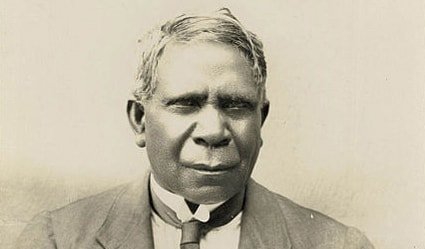The man on our $50, David Unaipon, was born on this day

ON 28 SEPTEMBER 1872, David Unaipon was born on a modest indigenous mission on the banks of South Australia’s Lake Alexandrina, 80km south-east of Adelaide.
Today, the church at Point McLeay Mission (later named Raukkan) and Unaipon’s face both grace the Aussie $50 note. Beside them is Unaipon’s best-known invention – a modified design for shearing shears that changed the once circular blade to a straight one. It’s a design still used today.
But, the shears were just one contribution among many. David was a polymath (someone with a wide or encyclopaedic knowledge). He was also Australia’s first published indigenous author, writing newspaper articles on everything from perpetual motion to helicopter flight; studied and published papers on indigenous legend; campaigned for indigenous rights; and advised government on indigenous affairs.
Indeed, he was a man with a vision akin to Leonardo da Vinci’s. In 1914 he wrote: “An aeroplane can be manufactured that will rise straight into the air from the ground by application of the boomerang principle …the boomerang is shaped to rise in the air according to the velocity with which it is propelled, and so can an aeroplane. This class of flying machine can also be carried on board ships, the immense advantages of which are obvious.”
Several experiments in vertical take-off had already been made, unbeknownst to Unaipon. But, the first helicopter didn’t fly until 1930 and used almost exactly the principle he had described.
- DNA confirms Aboriginal culture one of Earth’s oldest
- One this day: indigenous artist Albert Namatjira was born
- The Sapphires: where are they now?
Unaipon’s inventions and influence
Unaipon lodged his first patent for the shears design in 1909 and they went on to deliver huge economic benefits to the Australian wool industry, a major sector of the time. Between 1909 and 1944, Unaipon lodged nine other patents, pioneering ideas such as centrifugal motors, mechanical propulsion and multi-radial wheels. But, he never made much of a profit from his inventions, as their designs were largely stolen or used illegally, and he continued to live on-and-off at Point McLeay.
Nonetheless Unaipon had unusual reach and influence for an Aboriginal man of the era. He preached across the country and argued that there were similarities between Christian and Aboriginal values.
In the early 1920s Unaipon was commissioned by the University of Adelaide to assemble tales from Aboriginal legend. Through this he became the first published Aboriginal writer and from 1924 onwards wrote numerous articles for Sydney’s Daily Telegraph. He also published three short booklets of Aboriginal stories in 1927, 1928 and 1929.
Unaipon also advised on government indigenous policy, lecturing on Aboriginal customs, legends and social conditions, and assisting the Bleakley inquiry into Aboriginal welfare between 1928-29.
David Unaipon’s reputation
The media followed Unaipon’s activities throughout much of his life and over time the eloquent, tee-totaller earned a widespread esteem.
“Unaipon is a philosopher, inventor, and musician, who devotes his spare time to the study of evolution. He quotes Newton, Huxley, Darwin and other evolutionists and philosophers,” wrote the New Zealand Herald on 23 July 1914 in an article titled ‘An Aboriginal Genius, scientist and inventor’.
“For many years past… Unaipon has been on omnivorous reader. Often after a day’s work he will stay up until the small hours of the morning deep in the study of Newton’s works and other research…His achievements stamp him as a man or remarkable natural attainments.”
In 1953, at the age of 81, Unaipon was awarded a Coronation medal to celebrate the coronation of Queen Elizabeth II. He continued to preach in Adelaide, despite being often refused accommodation because of his race.
In 1988, 21 years after his death, Unaipon was honoured by the establishment of the annual national David Unaipon Award for unpublished Aboriginal and Torres Strait Islander writers.
Ultimately, Unaipon believed Aboriginal people should be given the chance to become a part of the modern world, but on their own terms rather than by assimilation.
“The coming of the white man was in itself a blessing. We were isolated from the world’s culture. It is true that my people could not adapt themselves to civilization, but that is because it came too suddenly for us,” he wrote in The Register, on 3 October 1925.

